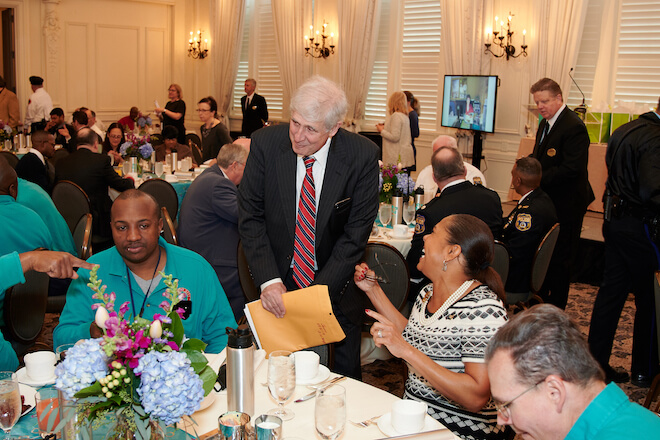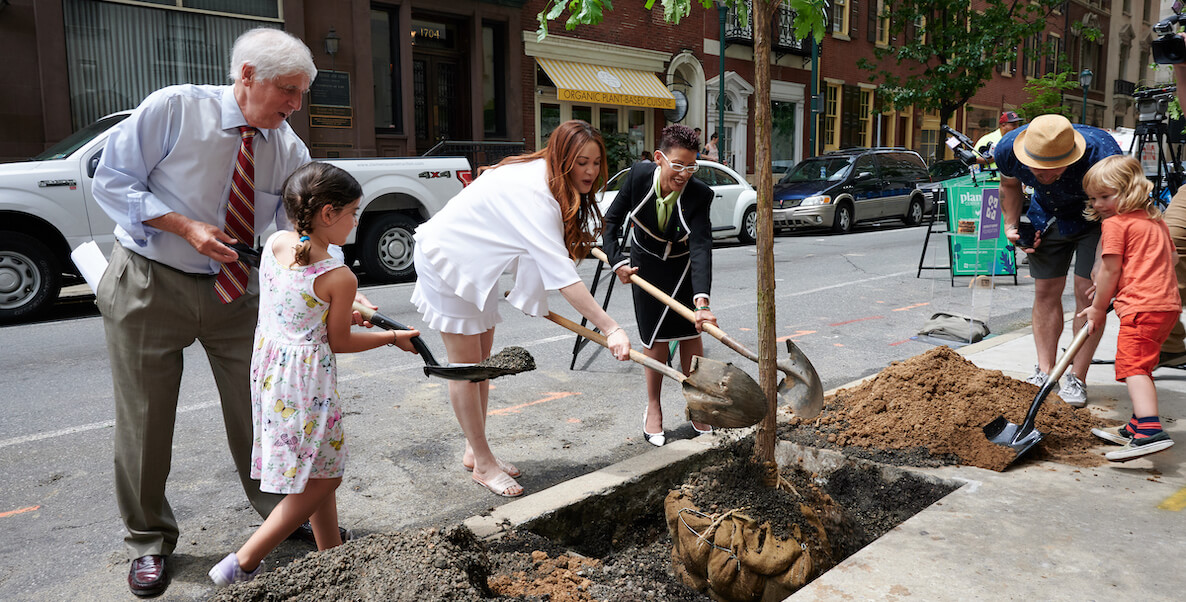The affection didn’t come by way of family history; Philly wasn’t in Paul Levy’s blood, the way it is with some folks here. A native of North Jersey, he went to college in Easton, PA before earning a doctorate in history at Columbia University. He moved to a mountain town in upstate New York before finding his way here at 29 because, he figured, it was time to move back to a city, and he didn’t want that city to be New York. He had college friends in Philadelphia. Why not check it out?
That was in 1976, back when the city barely straddled the line between gritty and downright grim. Back when the Ben Franklin Parkway — Philly’s grand avenue — was dotted stretches of nothingness; when the western welcome mat to City Hall was a drab slab of concrete; when Center City itself was perennially dirty. Rough around the edges. Desolate once the sun went down.
Levy saw it like this, and loved Philadelphia anyway. The city’s history. Its scale. Its walkability. That was true from the very beginning. And then he spent the next half century, give or take, helping turn it into a place that the rest of us might love, too.

For his vision, commitment and impact, Levy is being honored with a 2023 Citizen of the Year Lifetime Achievement Award. He’ll receive this honor alongside his fellow awardees at a celebration on January 30 at Fitler Club featuring MSNBC’s Ali Velshi in conversation with actor/activist George Takei. You can get your ticket here.
Learning by doing
Levy, who is retiring this month from his post as the founding CEO of Center City District, came to Philly with no job. His background was in education, but nobody was looking for teachers. What Philly needed was people in community development, and that’s how Levy’s career first took a turn into civics. He got a job in community organizing, and it turned out he had a knack for it, for neighborhood building. He went on to work for the City under Bill Green and, briefly, Wilson Goode in the Office of Housing and Community Development. But after federal budget cuts gutted his own budgets and programs, he felt a nudge toward something different.
“I remember thinking, ‘Why am I always on the wrong side of the market?’” Levy says. He took a job with Penn in real estate redevelopment — not the wrong side of the market, in other words, and also, a gig that would give him experience managing major real estate projects, from design to construction to negotiations with property owners, the City and the University.
In 1990, he moved on from Penn and into an executive role with the planning nonprofit known as Central Philadelphia Development Corporation. By 1991, that group gave rise to a more focused planning entity, the Center City District (CCD). CCD would be a business improvement district and planning entity, funded by fees paid by downtown businesses. Levy would run it.
“No Philadelphian is more responsible than Levy for transforming downtown from the hellhole of the 1980s to the archetype of intimate, walkable urbanity it’s become.” — Patrick Kerkstra, in Philadelphia Magazine
The way Levy understood it, this job was about building support for a city that had lost the confidence of its citizens — the ultimate community-organizing gig. Though this community happened to include government, developers, property owners — all groups he now knew well. It felt like a blend of social policy and market competitiveness. It felt, he says, like a job “perfectly created for me.”
Fast forward 30 years, and this now seems just like a matter of fact. Of course he was made for this job. But nobody then — including Levy — could have possibly predicted the impact that his CCD would have on Philly. Who would have conjured up the joy that his Sister Cities Park would bring to a barren stretch of Parkway? Or what an ice rink, a fountain, a coffee shop could do for Dilworth Plaza, for the whole mood of City Hall? Or even just the transformative aesthetic, economic and social power of street sweepers on Chestnut Street?
“With apologies to Ed Rendell,” wrote longtime Philly journalist Patrick Kerkstra in 2013, “no Philadelphian is more responsible than Levy for transforming downtown from the hellhole of the 1980s to the archetype of intimate, walkable urbanity it’s become.”
In fact, even former Mayor Rendell believes this. “He came up with one solution after another,” he says of Levy, whose early tenure overlapped with Rendell’s tenure as mayor. “He helped deal with our most taxing problems in trying to turn downtown around.”
The Paul Levy eras
How, exactly, did he do this? Levy tells the story in terms of eras. Epochs. As in, first, there was CCD 1.0, when they focused mainly on making the place clean and safe.
“When we launched the first day of spring in 1991, there was suddenly an army out there doing cleaning, and shortly after that, graffiti removal, and after that, public safety,” he says. (Center City’s uniformed public safety officers, were — and are — unarmed monitors meant to simply assist the public, or, if need be, liaise with police. “A master stroke,” Rendell says.) Immediately, Levy says, “We got disproportionately positive press. It was like a miracle.” And this drove home for him not just the extent to which “the quality of the public environment” mattered in people’s psyches, but also, just how effective a group like CCD could be.
So that was CCD 1.0: Clean and safe, plus a bit of cajoling businesses to stay open late one night a week to add a little life out there on the streets. It worked.
Next up? CCD 2.0 saw streetscape improvements, landscaping, lighting, traffic calming on the Parkway, the first of many reported and published assessments of and plans for the future of Center City (remember, Levy is an academic) … plus some money from the City to work with. Meantime, Levy joined other heavy hitters in government and real estate to push for the 10-year tax abatement that boosted the conversion of old vacant buildings in the city, launched the condo boom. The place was on the upswing.
Time for CCD 3.0: The parks. Levy’s public-space renaissance began with Cafe Cret in 2003 — a cute little cafe planted on a tiny forgotten triangle on the Parkway — and snowballed into the enchanting John F. Collins Park on Chestnut Street; the $4.9 creation of Sister Cities; the $60 million glow-up of Dilworth — a.k.a., to Levy, “the project that turned my hair totally white.”
“It’s fair to say that Paul Levy was the idea man behind many of the things that make downtown so attractive.” — former Mayor Ed Rendell
These ideas, too, worked, judging by the cross section of Philadelphians you can find at these parks, at any given moment.
“It’s fair to say that Paul Levy was the idea man behind many of the things that make downtown so attractive,” offers Rendell, and that seems true, though Levy is quick to credit every person who has given him advice or he’s worked with, hired to run a project, leaned on for expertise, or some way been engaged with, up to and including his replacement, Prema Katari Gupta, whom he hired three years ago expressly for this purpose. (“I think the world of Prema’s talents,” he says.)
In fact, on the occasion of his retirement — well, semi-retirement, given that he’s taking a position on the CCD board and staying involved in the second phase of the Viaduct Park and hoping to be involved in the reimagining of Market East, should there be a new stadium — if you ask him about legacy, this group mentality is where his thoughts take him: the people he’s worked with across disciplines, the deals they’ve made linking multiple interests, the fact that “we got police and security and designers and social media and marketing people and people with a broad spectrum of opinions about the world to sit around a table, trying to figure out how to solve a problem.”
That, he says, is what he’s most proud of, what has influenced his own thinking — and thus our city as we know it today: “Getting people out of silos. Getting out of the world of either / or.” Bringing people together to do it. And just look around Center City — who has brought more of us together than Paul Levy?
It’s Paul Levy’s Center City. The rest of us are just living in — or enjoying — it. And for that, we’re grateful.
Paul Levy is one of 11 Philadelphians who will be honored on January 30 at the inaugural Citizen of the Year Awards, featuring MSNBC’s Ali Velshi in conversation with actor and activist George Takei. To buy individual tickets, click here. If your company or organization would like to sponsor the event or purchase seats for a full or half table, please contact KL@thephiladelphiacitizen.org
![]() MORE GREAT PHILADELPHIA CITIZENS
MORE GREAT PHILADELPHIA CITIZENS
Paul Levy, far left. Photo courtesy of Center City District.




